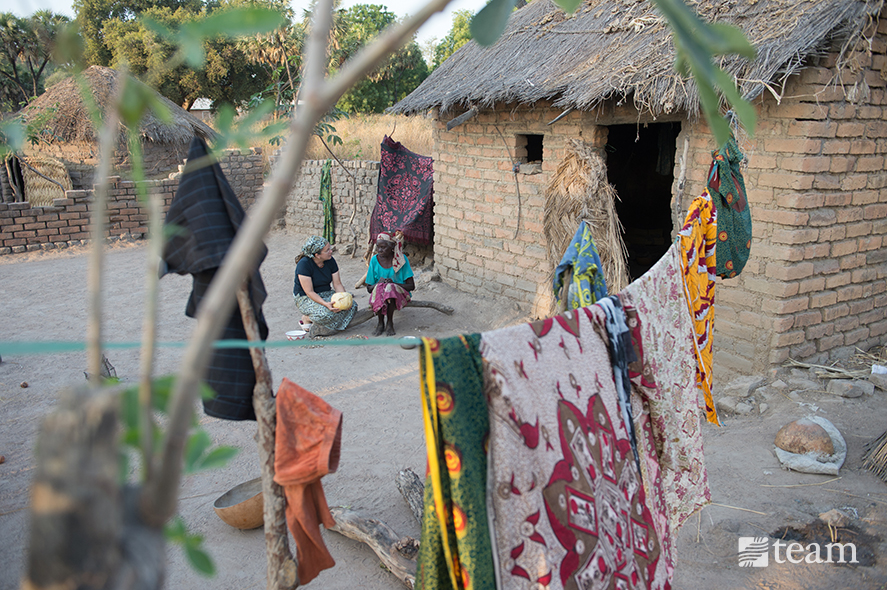
Prayer Focus
How to Pray for Unreached People Groups
August 1, 2021
by Mark Watson

What pops into your mind when you read the words “unreached people groups”?
Simple, tribal living or high-tech, city life? Intense religiosity or no religion at all? Commitment to community or extreme individualism? Hard-to-reach or just a plane ride away?
Actually, any of those answers could be correct.
Ask TEAM missionary Eric Kroner about the unreached people group (UPG) he serves in Chad, and he’ll share about farmers who live without electricity or running water.
“They are very much aware that their livelihood is dependent upon rains, at the whim of disease, and with the very rhythms of day and night,” Eric says. “Because of this, … spirituality is inseparable from who they are.”
WATCH: See what it’s like to live and serve among the unreached people of Chad.
But ask Kelly Baughn about the UPG she serves, and you’ll get a completely different answer: “Japanese are generally materialistic and apathetic toward spiritual things.”
The people of Tokyo have every convenience they could desire. Their local airport is one of the busiest in the world. Yet, Japan is the second largest unreached people group in the world.
As we pray for unreached people groups, we are lifting up communities that can look vastly different from each other. Still, their core needs are the same. They need messengers of Christ in their communities. They need the Holy Spirit to open their eyes.
Will you pray for unreached people groups?
1. Ask God to break down spiritual and cultural strongholds.
As a culture waits to hear the Gospel, spiritual powers build up strongholds. False religions are created, and their practices permeate daily living. Religious leaders gain power they are loathe to give up.
Missionaries in these parts of the world work hard to show that they are friends, not enemies. Sometimes that means building up the community through medical aid, education, infrastructure and other resources. Other times, it’s as simple as visiting with people in the local tea shop.
As missionaries do earn local trust, they have to figure out how to explain the Gospel in a culturally understandable way.
“In the States, everyone is familiar with Jesus. … The people I work with have never seen a cross,” says Willow, a missionary to Asia. “There is nothing in their culture that provides a clear bridge for the Good News. Having our words backed up through action is the only way to reach them.”
Ask God to help missionaries think strategically and to open doors for deep, meaningful relationships. Pray as Paul did in Ephesians 1:18, that the eyes of their hearts will be enlightened in order that they may know the hope to which God is calling them.
2. Pray for strong first- and second-generation churches.
Aidan* has served indigenous people in the Middle East for decades. He says, “While it is still very slow going among these very, very unreached people groups in our area, I think it will only take a few of their own people coming to the Lord and being bold witnesses to open these UPGs to the Lord on a large scale.”
However, without a strong church, even the most powerful Gospel movement will come to an end. New believers need to be discipled so they can follow God’s commands and teach them to others. And non-believers need to see that following Christ doesn’t have to mean giving up everything about your culture or relationships.
“We don’t want to extract the new believers so they lose their relationships and impact among their community,” says Genevieve, a missionary to Asia. “We pray for the Holy Spirit to grow the church in a way that is sound and maturing while maintaining the beauty of the culture of the unreached people group.”
Pray that new believers will grow deep in their faith. Pray that they will know how to show Christ’s relevancy to their friends and neighbors. And pray that they will know how to support one another as they face opposition, that they will stand firm together.
3. Ask God to send more workers and equip local believers in ministry.
Serving an unreached people group requires a unique type of endurance. “Some countries have astonishing response to the Gospel. Japan does not,” Kelly says. “Sometimes missionaries have a difficult time just being patient and faithful.”

It’s not enough to pray for more workers; we need to pray for the right kind. We need to ask God to prepare people, teaching them patience, diligence, sacrifice and, above all, true faith in God. Pray that people will be willing to serve in difficult areas, trusting God to provide the growth.
Missionaries also request prayer for local siblings in Christ. Being one of the first followers of Christ in your community can be frightening. “We pray for courage and the ability to respectfully communicate the Gospel in holistic and loving ways,” Genevieve says. “We pray for believers to not grow weary or despair.”
As you pray broadly for unreached people groups, we also ask you to lift up these specific requests from missionaries serving them:
- The president of Chad was recently killed, thrusting the nation into a state of upheaval. Eric asks for prayer that the country will have a just transition of power, with a government committed to serving the poorest of the poor. “Pray that recent events will lead to an openness to the Kingdom of God, which brings enduring justice and peace to the land,” Eric says.
- Kelly’s family is preparing to move into a new community in Tokyo. Pray for them as they seek to use their home as a base for community outreach. Pray that they will be able to develop relationships quickly and host Bible studies in their home.
- Due to new travel restrictions, missionaries are struggling to get in or out of the region Genevieve serves. Please ask God to open doors for His work to be done and His people to find rest as needed.
- Much of Aidan’s ministry happens by meeting with people face-to-face, which has been challenging during the pandemic. He asks, “Pray for divine encounters, with the Lord brining us across the paths of those who are wanting to know the truth and also may be influencers among their own people.”
*Some names in this article have been changed to protect missionaries’ privacy.

